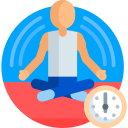Efficient Self-Care Strategies for the Time-Poor
Micro-Moments Mindfulness
Our breath is a portable, invisible companion, always within reach. When you’re pressed for time, consciously anchoring your attention to a few deep, slow breaths can ground you quickly. Breath breaks take only a minute or less but can regulate your nervous system, lower tension, and improve mental clarity. During a hectic workday or a stressful commute, pausing for a mindful inhale and extended exhale sends signals of safety and calm to both brain and body—offering a reset even amidst chaos.
Sensory check-ins are micro practices that leverage your immediate environment: feeling the texture of your coffee mug, hearing the hum of distant traffic, or noticing the light in your workspace. This strategy is about pulling your attention away from swirling thoughts or digital distractions and reconnecting with your present moment through your senses. For the time-poor, it requires no extra time—just a subtle shift in attention—yet the grounding effect can disrupt autopilot mode and reinvigorate your perspective in seconds.
Gratitude flashes invite you to quickly acknowledge something positive in your day, even if it’s as simple as a comfortable chair or a friendly message. This fast mental exercise can be woven into existing routines—while logging into your computer or just before sending an email. Research suggests that such brief acknowledgments boost mood and resilience over time. With practice, these flashes become second nature, helping you protect your emotional wellbeing without adding to your to-do list.

You don’t need to carve out an hour for fitness to experience its benefits. Snackable movement is the art of breaking up physical activity into small, manageable doses—whether that’s doing stretches at your desk, taking a brisk walk around the block between meetings, or standing for a few jumping jacks after a video call. These mini-sessions increase circulation, offset sedentary habits, and can boost mood thanks to endorphin release. They’re both accessible and powerful, helping you stay active despite a demanding schedule.

Nourishing your body efficiently means prioritizing simplicity and quality. Instead of complex meals, think in terms of quick combinations: a piece of fruit with nuts, yogurt with berries, or pre-cut veggies with hummus. Preparing basic, healthy snacks in advance reduces decision fatigue and helps you avoid reaching for highly processed options. By keeping nutritious food visible and within reach, you support stable energy and concentration throughout the day without culinary effort or time-consuming choices.

Quality rest is essential, even for those who feel they can’t spare the time. Micro-rest refers to intentional mini-breaks—five-minute power naps, a brief moment with eyes closed, or even just reclining and listening to calming music. These short pauses can refresh your brain, enhance creative thinking, and support emotional regulation. Rather than waiting for rare windows of extensive downtime, embracing micro-rest lets you recharge as you go, building small oases of recovery into your daily grind.
Boundary Setting in a Busy World
In a hyperconnected age, the temptation to be always available is strong, but continuous digital engagement can erode your focus and mental health. Digital detachment rituals—such as disabling notifications during focused work, setting phone-free meal times, or designating a daily “do not disturb” hour—allow your mind to rest and reset. Implementing these rituals can help you reclaim agency over your attention and reinforce over time that your boundaries matter, even when your schedule is packed.

